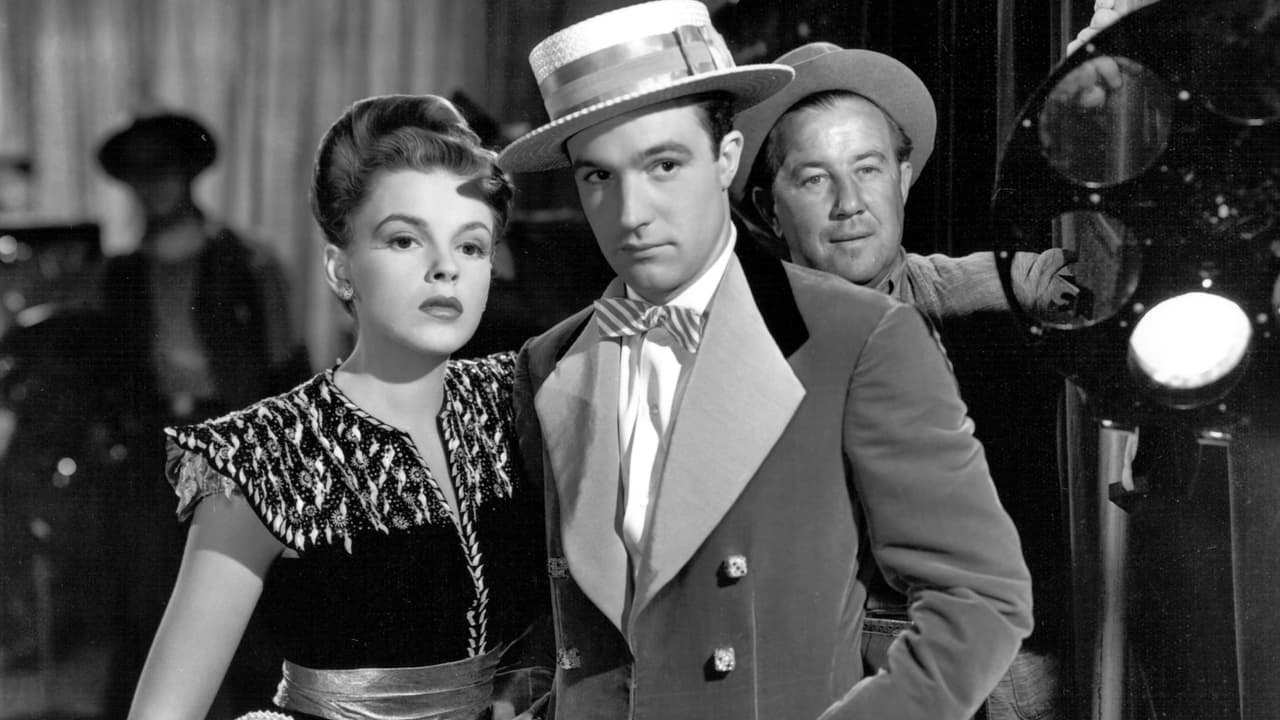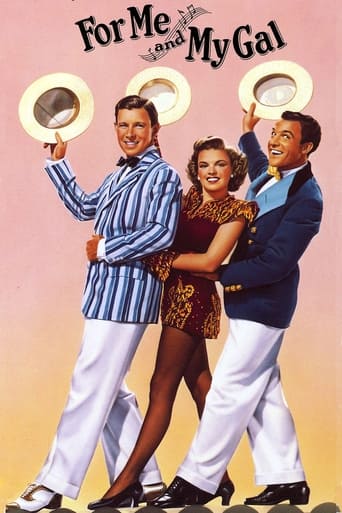

"The clouds are singing for me and my gal. . ."The title song is pretty much the only memorable part of this movie, sung by Judy Garland and a newcomer to Hollywood, Gene Kelly. He was a Broadway star and made a smash in his film debut. To see all his collaborations with pint-sized Judy, rent The Pirate and Summer Stock for a song-and-dance-filled weekend!The plot of For Me and My Gal is actually very interesting, but since it didn't exactly send the right message in 1942, that's not the part of the movie most people remember. Judy and Gene are a married couple with dreams of stardom, but just when they're about to make it, Gene gets drafted for WWI. While Judy's brother, the fantastic dancer George Murphy who no doubt joined Gene Nelson in the "I'm jealous of Gene Kelly" fan club, fights in the war gladly, Gene doesn't want to give up his career. In a very controversial decision, he purposely injures his hand to avoid the battlefield. If you like WWI or WWII dramas in black-and-white, with some songs and dances thrown in for morale, you won't go wrong with For Me and My Gal. It's romantic, patriotic, and it makes you think about how far you'd go to realize your dreams. Plus it's got Gene Kelly in it.
... View MoreThis is one of my favorite of the Judy Garland movies. Being a big fan of her and her music, I've seen at least fifteen of her films, and this made it as my #2. 19 year-old Garland is our film's star, and top-billed for the first time. Besides her, this movie features Gene Kelly, fresh off from Broadway and in his first feature film. Alongside them is the always reliable George Murphy, who last starred with Garland in Little Nellie Kelly (1940). While Garland did play an adult for part of Little Nellie Kelly, this was the first film in which she had a complete adult role. We also have a guest in Marta Eggerth, an experienced opera singer who has a small part in this movie, and had a more significant part in Garland's next film, Presenting Lily Mars (1943).Garland easily shined above the rest. Being in her fifteenth picture, she was already a polished actress, and it definitely shows in some of the more dramatic moments. Her singing was just wonderful, having reached a new level of maturity. Her dancing was actually very good considering she was never actually a dancer. But she could pick up anything thrown her way. She was perfect.Kelly was a good co-star. Being as inexperienced as he was, he still acted pretty well, but that inexperience did show at some points. His dancing was brilliant of course, he was one of the best dancers at the time, second only to Fred Astaire. He was never really a singer, but he was okay. Murphy, sadly, was grossly underplayed, especially in the love triangle, but he did well as a supporting character. I wish he had gotten a little more screen time.The songs were wonderful. I find myself singing them all around my house. The sets were well put together and the plot was mostly tight. The ending was obviously tacked on, but I was able to ignore it.But my absolute favorite part of the movie was when Garland and Kelly sang "For Me and My Gal." I was actually surprised that it was played less than twenty minutes in, considering it was the title song, but I loved it all the same. I consider it to be one of the famous magical movie moments. The pacing, the dancing, the accompaniment, it was all so perfect. And of course, it was sung by the person Fred Astaire called, "The greatest entertainer of all time," Judy Garland.This movie will definitely put you in a good mood, despite its minor flaws. And for Garland fans such as myself, it will be a delight. The bells are ringing For Me and My Gal.
... View MorePerfect training material for prospective manic-depressives, as a series of emotional roller coaster rides punctuate this story. Short on comedy and relatively short on dancing and elaborate stage numbers, it features no new song, but plenty of standards of the early 20th century and WWI era, mostly sung by Judy, sometimes accompanied by others. The most memorable musical number is the one not performed on a stage:the title song, which became 'their song' for Judy and Gene. Their duet, followed by a dance, was a show stopper. Ironically, only a few minutes before this scene, Judy(as Jo) still has Kelly (as Harry) pegged as a fast-talking small-time bore of a stage comedian, with an over-sized ego and ambition. Especially in the first half of the film, Kelly's character clearly is largely taken from the lead character, Joey Evans, which Kelly had just played, in the Broadway production of "Pal Joey". Although Harry's first stage performance was as a costumed clown, who does a bit of dancing and gymnastics, there was little effective comedy in this production. Ben Blue, who showed up periodically,was supposed to be the main comic relief, but I found his limited physical comedy quite flat.We see part of Kelly's clown act repeated in "The Pirate", and I'm sure I heard a few bars of "Be a Clown" at the end of his act, but supposedly that wasn't composed until 6 years later! Kelly would provide much of the comedy in many of his subsequent films. He would also have much more effective comedic talents to partner with, including: Phil Silvers, Don O'Connor, Jules Mushin, Betty Garrett, Van Johnson, Dan Daily, and even Jerry, the Mouse!Vaudevillian George Murphy, who originally was slated to take Kelly's male lead role,got bumped to mostly a male shoulder to cry on, when Judy or Kelly was being blue or in trouble. Actually, he had two stage performance roles near the beginning. He is the male lead in the "Oh, You Beautiful Doll" stage production,within which Judy's "Don't Leave Me Daddy" is sandwiched. Again, he partnered with Judy in "By the Beautiful Sea", which was interwoven into Ben Blue's supposed comedic "The Ocean Roll" dance routine.I don't know what possessed them to cast Martha Eggerth, as Eve Minard, Jo's competition for Harry, at one point. Her operatic singing style seemed so out of place, like Judy had to compete against Dianna Durbin, all over again. Perhaps the point was that Harry was willing to do whatever it took to achieve his ambition of getting into acts at the Broadway Palace. In any case, the cordial exchange between Judy and Martha in Martha's apartment and the subsequent tense exchange between Judy and Kelly in Judy's room,is one of the melodramatic highlights of the film.Will Harry prove what Eve said about his character? Another melodramatic crisis occurs when Harry intentionally injures his hand to avoid being immediately drafted into the army, followed by a telegram saying that Jo's beloved brother has been killed in action. Harry now wants to get into the armed serves to avenge the death of Jo's brother, but nobody will take him with his crippled hand, and he can't perform his vaudeville act well with his hand, either. Jo joins the YMCA overseas entertainers unit, and is soon entertaining in France. Later, Harry joins this unit, along with Ben Blue. While near the front, Harry takes advantage of a situation to upstage Sergeant York, in cleaning out a German machine gun nest, and warning an Allied convey about a German patrol ready to ambush them. This was a very risky, illegal, action on his part, but this action has negated his anti-hero image. At a victory performance at the Broadway Palace, Jo is singing various songs, when she spots Harry in the audience. The band then plays "For Me and My Gal", and we know the film is about to end.I noticed that Kelly did a lot smirking at times, near the beginning. Maybe he told to cut this out. Also, in a few places, Judy's acting seemed awkward. Kelly was nearly 30, having spent years in various roles relating to stage productions and in dancing instruction. Before this introduction to film making, he seemed content with stage productions. Beginning with "Cover Girl", he would discover that creating and performing in film dances was the best use of his entertainment talent.Judy and Kelly wouldn't do another film together for another 5-6 years. By that time, Judy was in a bad mental state from her chronic insomnia and drug taking. Nonetheless , she finished the controversial "The Pirate", directed by her then husband. Unfortunately, she was still in this state of mind when she costarred with Kelly in her last MGM film, "Summer Stock". Thus, despite the limitations of the present film, many people find it the most endearing of the 3 films in which she costarred with Kelly.
... View MoreHow both stars must have rolled their eyes when they read this screenplay. The volume of clichés is atrocious: The oversentimental celebration of vaudeville; the romantic triangle; the heel gaining a conscience; the splitting-up-the-act intrigue; the brother and his fate; lines like "you'll never be ready for the big time, because you're small-time in your heart" (Judy nevertheless makes it work). Yet it's a pleasure to view, because Judy and Gene really bring out something special in each other. They did again in "Summer Stock"; in "The Pirate," to my eyes, not so much. She has a gravity and sincerity that balance his self-adoration and schtick, and he was always more persuasive playing a guy of questionable moral values than a mensch. You have to put up with George Murphy at his dullest and Ben Blue at his unfunniest, and Marta Eggerth, as accomplished as she is, appears to be in the wrong movie--she should be doing a Joe Pasternak operetta, not an Arthur Freed extravaganza. But when the two leads sing or dance (she was, in the Forties, a better dancer than she was ever given credit for) or, surprisingly, act together, they're tremendously moving. At her best, which she wasn't always but is here, Judy was the best there was. My favorite moment: the ending of "After You've Gone." Rather than smothering her performance in applause and cutting to a shot of an appreciative audience, Berkeley just fades out. It's MGM's way of saying: Enjoy it, folks, this is as good as it gets.
... View More